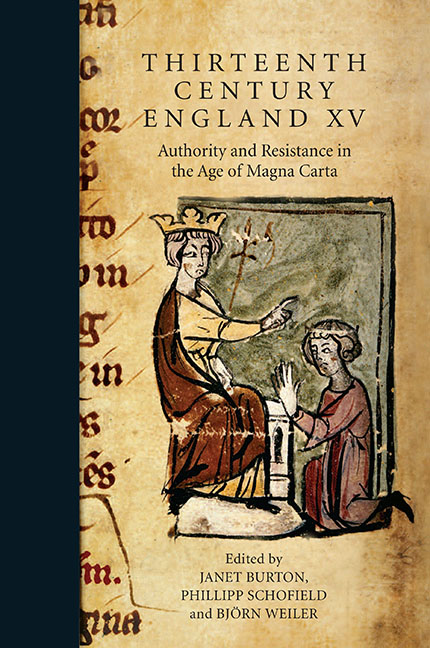 Thirteenth Century England XV
Thirteenth Century England XV Preface
Published online by Cambridge University Press: 11 June 2021
Summary
2015 marks the octocentenary of both Magna Carta and the opening of the Fourth Lateran Council, and the 750th anniversary of the Battle of Evesham. Commemorations will be manifold: a conference commemorating Lateran IV will be held in Rome, and an exhibition on Magna Carta at the British Museum. Magna Carta and the decrees of Lateran IV cannot be viewed in isolation, however: they emerged from a series of discourses about authority and its limits, and they in turn influenced subsequent discourses. They also built on practices of resistance by no means new to the thirteenth century, and they helped shape the repertoire of means and mechanisms with which dissent could be voiced for much of the thirteenth century. The contributions to this volume draw attention to this broader context of practices and norms. We requested that our contributors, rather than focussing exclusively upon the great events of 1215, give attention to the framework of authority and resistance. The resulting contributions have been grouped here according to the broad contexts in which they were set, with papers on landholding and secular politics, the church and religious orders and, lastly, in terms of contemporary imagery.
The issue of authority and resistance amongst elite and lesser landowners was an important strand and was central to a number of contributions. Peter Coss, in his opening lecture to the conference from which this volume springs, concentrates on the actions of lesser landowners, members of the knightly class, in the political controversies of the thirteenth century. His rich and nuanced discussion highlights the existence of networks of local and regional society and indeed of sub-networks. Ian Forrest also reminds us that power was sustained through acquiescence and support, and relationships, and argues that in the thirteenth century the basis of power of secular and ecclesiastical lords shifted: by the end of that century the traditional relationships, and the ways they were forged and sustained, were no longer adequate for a changed society. His paper, accordingly, rests on the replacement of the personal element of the brokerage of power by increased reliance by the powerful on people with whom they had no personal connection, and especially on local elites.
- Type
- Chapter
- Information
- Thirteenth Century England XVAuthority and Resistance in the Age of Magna Carta. Proceedings of the Aberystwyth and Lampeter Conference, 2013, pp. ix - xiPublisher: Boydell & BrewerPrint publication year: 2015
